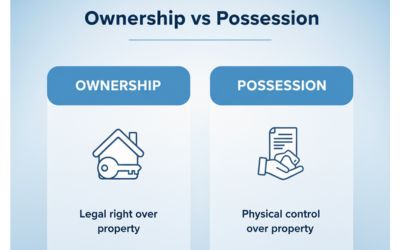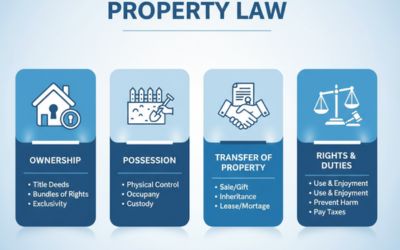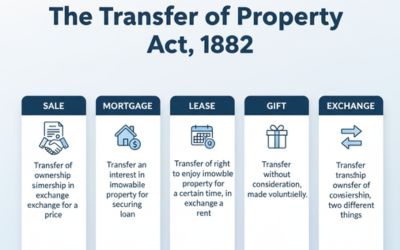Pratima Chowdhury v. Kalpana Mukherjee & Ors. (AIR 2014 SC 1304)

Quick Summary
The Supreme Court set aside a claimed transfer of a co-operative flat to Kalpana Mukherjee. The Court found that the transfer was not proved to be genuine, that legal formalities were not followed, and that the surrounding circumstances showed undue influence over Pratima Chowdhury. Possession alone could not create ownership, and Section 53A of the Transfer of Property Act could not be used to assert title.
Issues
- Can a flat transfer that ignores legal formalities vest ownership in the transferee?
- Can such a transferee protect possession against the true owner’s claim?
Rules
- Title passes only when law-required steps (e.g., proper registration and society rules) are followed.
- Consent must be free—no fraud, coercion, or undue influence.
- When the transfer is challenged, the person relying on it must prove its genuineness.
- Section 53A TPA is defensive. It can protect qualified possession but does not create ownership or an active title claim.
Facts (Timeline)
1987 Membership & Allotment
Indirani Bhattacharya joined the Orchestra Co-operative House Society, received shares, and was allotted a 900 sq. ft. flat for ₹4 lakh.
Late 1980s Transfer to Pratima
Indirani resigned in favour of Pratima Chowdhury and signed an agreement to transfer the flat to her.
1992 Nomination to Kalpana
Due to poor health and not shifting to Kolkata, Pratima wrote to the Society nominating her relative, Kalpana Mukherjee, as transferee.
1992–1995 Zero-Consideration Letters
Pratima signed letters/agreements said to transfer rights to Kalpana without consideration; later she alleged undue influence by Partha Mukherjee.
Arbitration Award Against Transfer
Arbitrator found the agreement invalid, void, and incomplete.
Appeals Tribunal & Courts
Co-operative Tribunal set aside the award; High Court upheld Tribunal; Pratima reached the Supreme Court by SLP.

Arguments
Appellant (Pratima Chowdhury)
- Consent for transfer was not free; Partha exercised a dominant influence.
- No consideration and no strict compliance with law/Society rules.
- Documents showed discrepancies; hence no valid transfer of title.
Respondent (Kalpana Mukherjee)
- Relied on letters and nomination to claim rights and possession.
- Asserted that possession should be protected; relied on Section 53A.
- Supported Tribunal/High Court findings in her favour.
Judgment
The Supreme Court allowed Pratima’s appeal. It restored the arbitrator’s view and declared the alleged transfer to Kalpana invalid. The Court noted a relationship of trust where Partha held a dominant position. On the facts, the burden lay on Kalpana to prove a clean, lawful transfer; she failed to do so. The Court also found it unnatural that a valuable flat would be transferred free of cost without a close relationship. Kalpana was directed to vacate and hand back possession to Pratima.

Ratio
- In a suspected dominance/undue influence scenario, the alleged transferee must prove a voluntary, lawful transfer.
- Non-compliance with legal formalities defeats the claim of title even if possession exists.
- Section 53A TPA is a shield, not a sword—no ownership flows from it.
Why It Matters
Co-operative housing transfers often rely on letters and internal approvals. This ruling warns that such steps cannot replace statutory requirements. It also clarifies that possession is not equal to title and that Section 53A cannot be stretched to create ownership.
Key Takeaways
- Follow the statute and the Society’s bye-laws; otherwise, no title passes.
- Zero-consideration with weak relationship = red flag.
- Undue influence flips the burden to the beneficiary of the transaction.
- Section 53A protects possession defensively, not ownership.
- Arbitrator’s fact-based findings can be restored if higher forums overlook key evidence.
Mnemonic + 3-Step Hook
Mnemonic: “FORM–FREE–FENCE”
- FORM: No formality, no title.
- FREE: Consent must be free from dominance.
- FENCE: Section 53A is only a fence (defence), not a gate to ownership.
3-Step Hook: Check Formalities → test Free Consent → limit to Defence under 53A.
IRAC Outline
Issue
Whether the flat transfer to Kalpana created valid title and protected possession despite alleged undue influence and non-compliance.
Rule
- TPA + Registration: title only after legal formalities.
- Contract law: free consent required.
- Burden: transferee must prove genuineness when challenged.
- TPA s.53A: defensive protection; no title.
Application
Evidence showed dominance and discrepancies; no consideration; procedures not proved. Kalpana did not discharge the burden of proof.
Conclusion
Transfer invalid; Tribunal’s order set aside; Arbitrator’s findings restored; flat to be returned to Pratima.
Glossary
- Undue Influence
- A stronger party uses a position of dominance to obtain consent; law then demands strict proof from the beneficiary.
- Section 53A TPA
- Part performance defence: protects possession if conditions are met; does not grant ownership.
- Co-operative Society Transfer
- Internal approvals + statutory registration/requirements; one cannot replace the other.
FAQs
Related Cases
Section 53A TPA – Shield, Not Sword
Quick reference on part-performance defence and its limits.
Undue Influence in Property Deals
Key rulings where dominance flipped the burden of proof.
Share
Related Post
Tags
Archive
Popular & Recent Post





































































































































Comment
Nothing for now